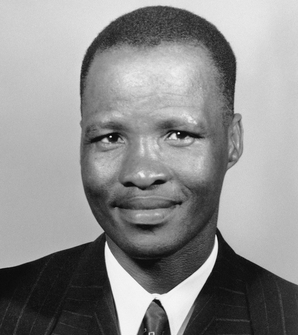Related Research Articles

Transkei, officially the Republic of Transkei, was an unrecognised state in the southeastern region of South Africa from 1976 to 1994. It was, along with Ciskei, a Bantustan for the Xhosa people, and operated as a nominally independent parliamentary democracy. Its capital was Umtata.

Ciskei was a Bantustan for the Xhosa people, located in the southeast of South Africa. It covered an area of 7,700 square kilometres (3,000 sq mi), almost entirely surrounded by what was then the Cape Province, and possessed a small coastline along the shore of the Indian Ocean.

King Kaiser Daliwonga Mathanzima, misspelled Matanzima, was the long-term leader of Transkei. In 1950, when South Africa was offered to establish the Bantu Authorities Act, Matanzima convinced the Bunga to accept the Act. The Bunga were the council of Transkei chiefs, who at first rejected the Act until 1955 when Matanzima persuaded them.

Bantubonke Harrington Holomisa is a South African Member of Parliament and President of the United Democratic Movement.
Princess Stella Nomzamo Sigcau was a Minister in the South African Government. Sigcau was also the first female Prime Minister of the bantustan of Transkei before being deposed in a military coup in 1987.

The Military Rule Medal was instituted by the State President of the Republic of Transkei to commemorate the bloodless 1987 military coup d'état which overthrew the Transkei government on 30 November 1987.
The system of racial segregation and oppression in South Africa known as apartheid was implemented and enforced by many acts and other laws. This legislation served to institutionalize racial discrimination and the dominance by white people over people of other races. While the bulk of this legislation was enacted after the election of the National Party government in 1948, it was preceded by discriminatory legislation enacted under earlier British and Afrikaner governments. Apartheid is distinguished from segregation in other countries by the systematic way in which it was formalized in law.
The Transkei National Independence Party (TNIP) was a political party in the nominally independent South African homeland of Transkei. It was founded by the Matanzima brothers, Kaiser and George. The party advocated cooperation with the South African government. As of 1985, the leader of the party was George Matanzima. The party governed Transkei from 1976 until the 1987 coup d'état by Bantu Holomisa.
The Democratic Progressive Party was a political party in the South African bantustan of Transkei. The party condemned apartheid rule. In the 1981 elections, the party won one out of 75 seats. In the 1986 elections it won two seats.
King Botha Sigcau was a King in Eastern Pondoland, Transkei, South Africa (1939–1976) and later the figurehead President of Transkei from 1976 to 1978. A graduate of the University of Fort Hare, Sigcau was an early supporter of the Bantu Authorities in Transkei and was rewarded by the South African government when he was appointed chairman of the Transkei Territorial Authority, the parliament before independence.
Parliamentary elections were held in the Transkei Bantustan, South Africa on 23 October 1968. The Transkei National Independence Party won 57 of the 75 elected seats.
Parliamentary elections were held in Transkei on 20 November 1963. Although the Democratic Party won a majority of the elected seats, the Transkei National Independence Party emerged as the largest party in the Legislative Assembly after the appointment of a further 64 members.
Parliamentary elections were held in Transkei on 24 October 1973. The Transkei National Independence Party won 25 of the 40 elected seats.
Parliamentary elections were held in Transkei on 29 September 1976. The Transkei National Independence Party won 69 of the 75 elected seats.
Parliamentary elections were held in Transkei on 24 September 1981. The Transkei National Independence Party won 74 of the 75 elected seats.

The Independence Medal was instituted by the State President of the Republic of Transkei to commemorate Independence on 26 October 1976. It was awarded to all ranks on the active strength of the Transkei Defence Force upon independence.

The Transkei Defence Force (TDF) was established during March 1981, from the 141 Battalion of the South African Defence Force (SADF). It was the defence force of the Republic of Transkei, a nominally independent bantustan during the Apartheid era of South Africa.
Rank comparison charts of armies/land forces of apartheid states and territories in Southern Africa.

The 1987 Transkei coup d'état was a bloodless military coup in Transkei, an unrecognised state and a nominally independent South African homeland for the Xhosa people, which took place on 30 December 1987. The coup was led by the then 32-year-old Major General Bantu Holomisa, the Chief of the Transkei Defence Force, against the government of Prime Minister Stella Sigcau (TNIP). Holomisa suspended the civilian constitution and refused South Africa's repeated demands for a return to civilian rule on the grounds that a civilian government would be a puppet controlled by Pretoria.
References
- 1 2 Elections in South Africa's Apartheid-Era Homelands "Bantustans" African Elections Database